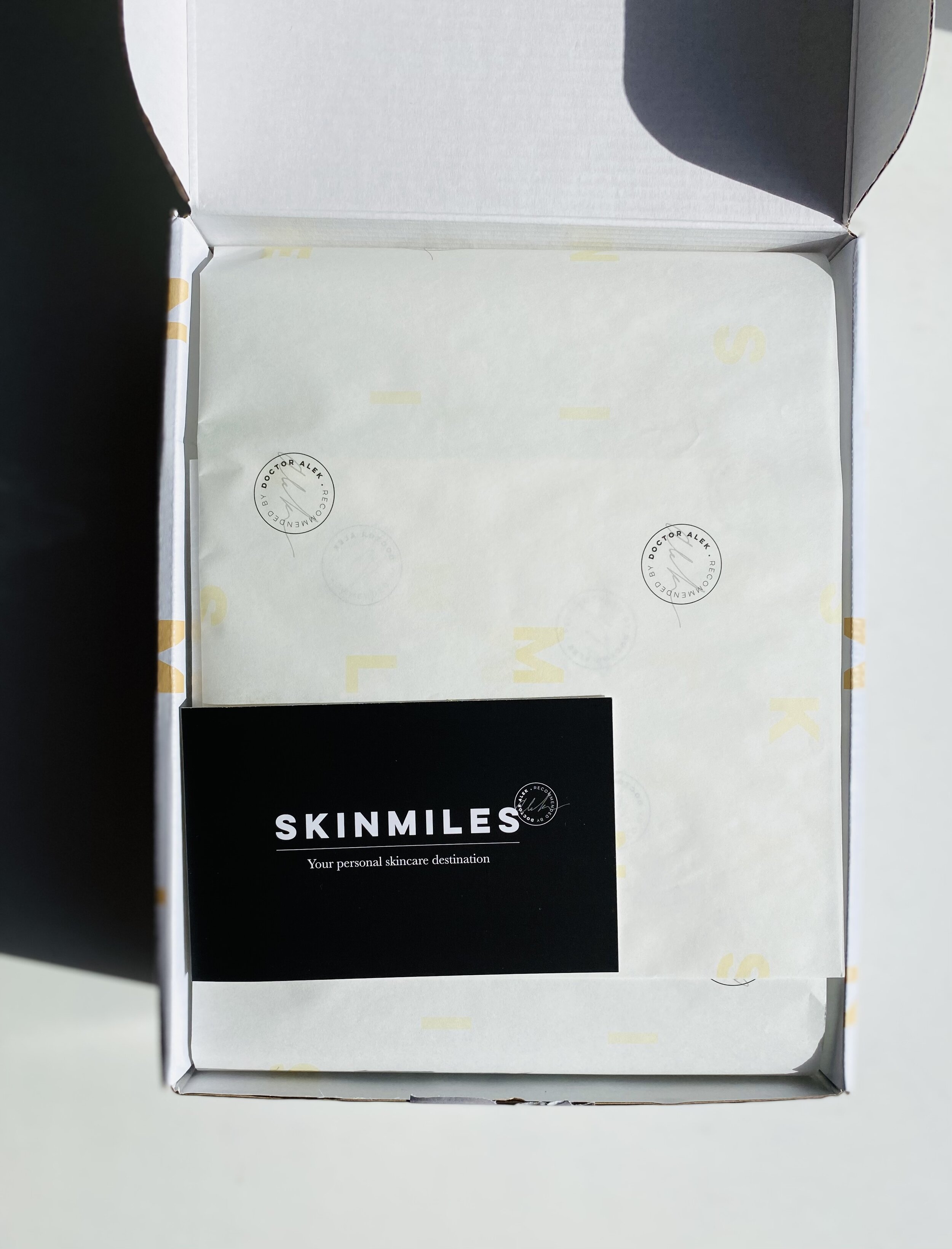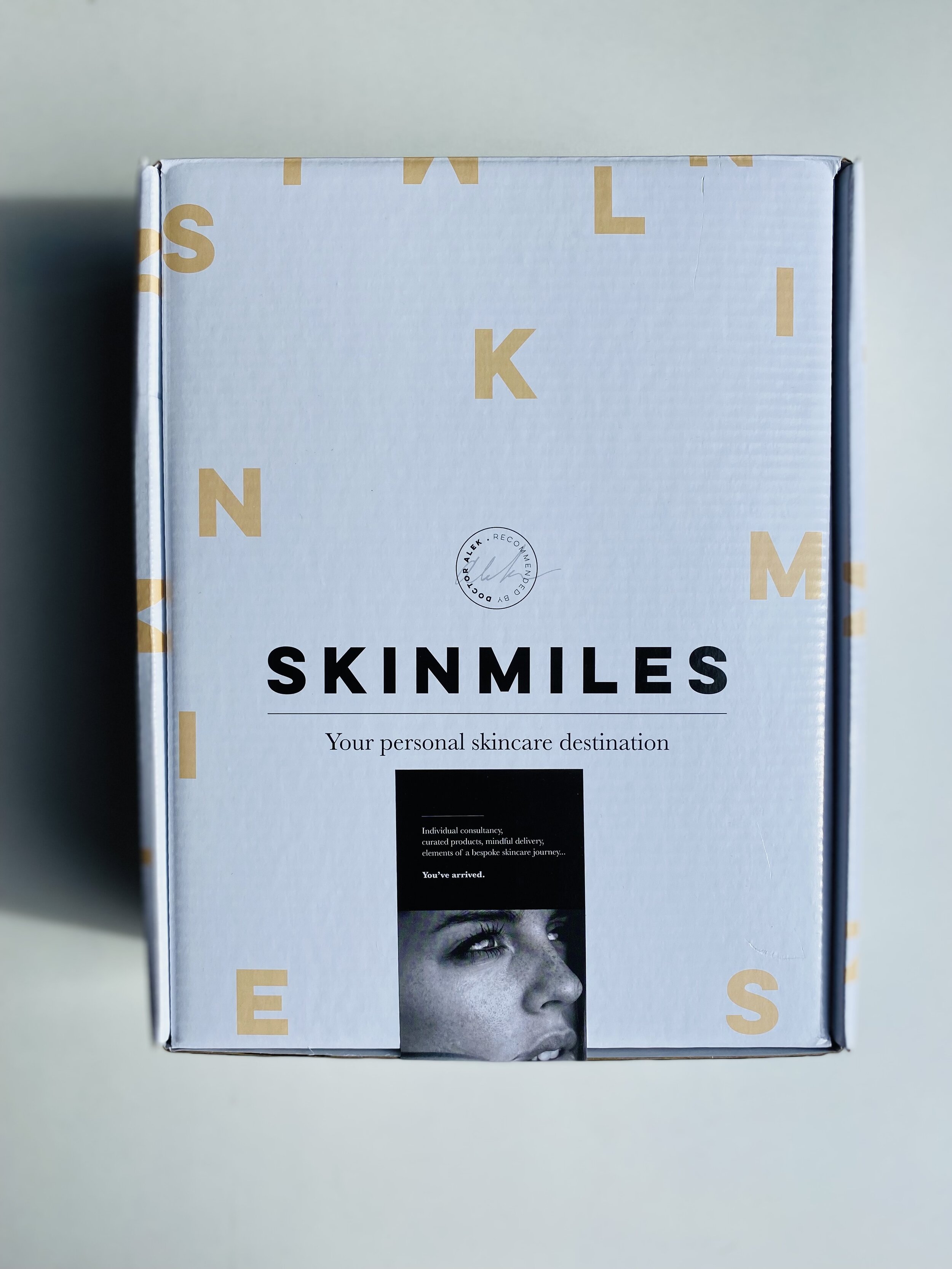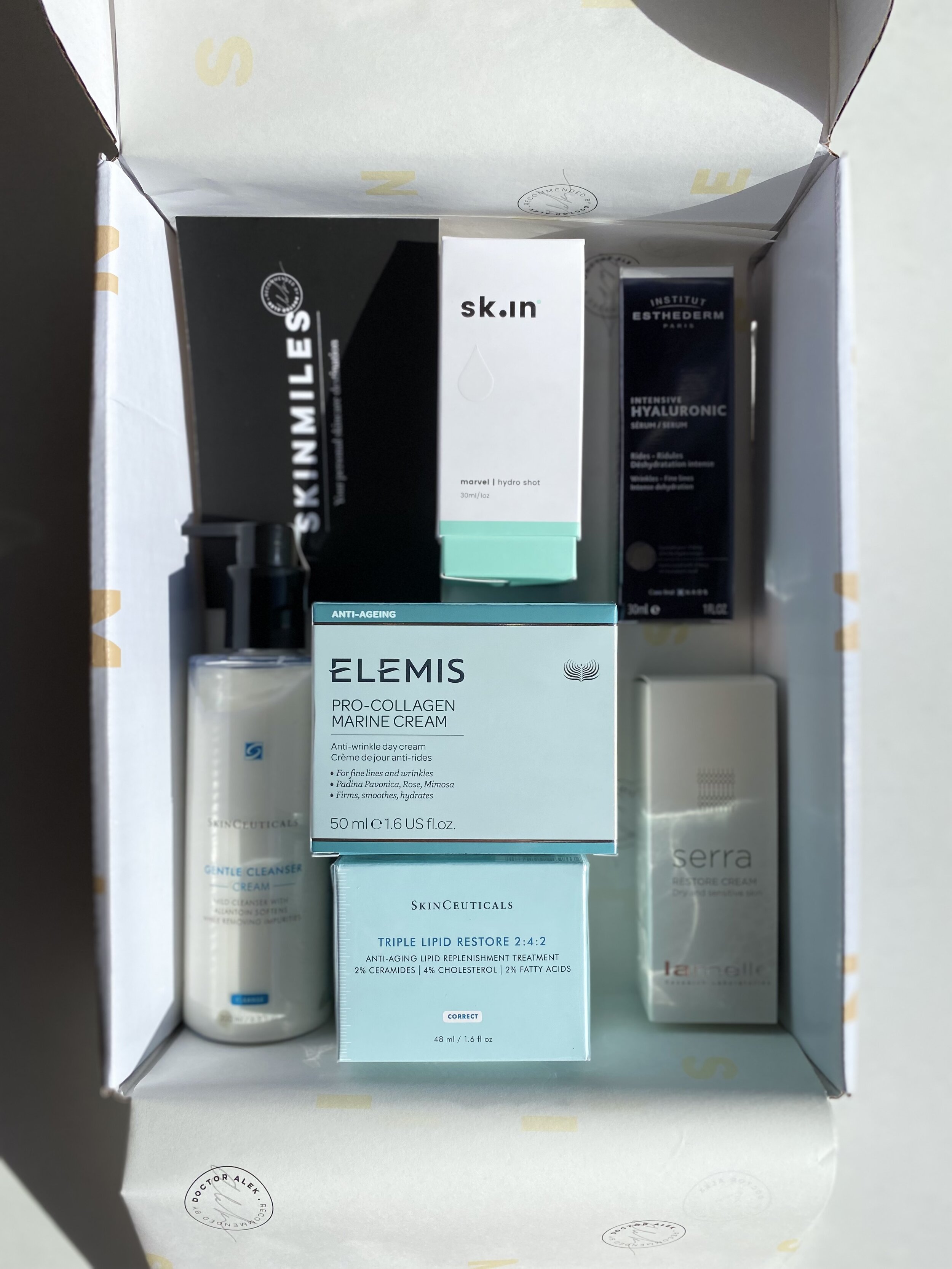‘Winter skin’ is a problem that a lot of us are currently experiencing. Dryness, dehydration, rosacea – the list is endless. Founder of SkinMiles, Dr Alek Nikolic comes to the rescue with his sage advice and product recommendations in this informative interview:
KELLI: Why does our skin change so dramatically during the winter months?
DR ALEK: This is purely an environmental change. The cold weather tends to be dryer with less humidity. This naturally strips our skin from essential moisture through trans epidermal loss. Compromise to the skin barrier will aggravate this water loss. Adding the use of heaters which further dry the air will also aggravate the skin and promote dryness.
KELLI: What can we do to protect our skin during winter?
DR ALEK:
- Avoiding very hot showers and baths.
- Adding a humidifier In our living area.
- Changing your moisturiser to a thicker consistency that contains lipids and ceramides.
- Adding a HA (Hylaronic Acid) serum to your regime.
- Using a creamy cleanser.
- Using a serum with vitamin C and E as these antioxidants help to protect the skin barrier.
KELLI: What basic rules should we be applying during winter?
DR ALEK:
Sunscreen is a must, irrespective of the weather. Try and drink at least 2 litres of water per day. Eat healthy fats such as olive oil (in your salad dressing) and avocados.
KELLI: What is the difference between dry and dehydrated skin?
DR ALEK: Dehydrated skin is fairly common and as a result most of us will suffer from dehydrated skin at one time or another.
Causes of Dehydrated Skin:
1. Weather and environmental changes
2. Pollution
3. Diet
4. Skin product usage (incorrect ingredients or excessive use)
5. Medications
6. Over-cleansing (or over-exfoliating) and too rough handling of the skin. The weather and environment are big ones.
Our skin experiences water loss in cold weather and when the environment has a low humidity. Heat sources such as fires and heaters evaporate water from our skins. Sun exposure during the summer months also play a big role in dehydrated skin.
Interesting Fact:
Dehydration affects all skin types including oily skin: Oily skin may look and feel oily but still lack water. This is typically caused by people who over-cleanse, over-exfoliate, or use harsh rough and granular cleansers.
These are the most common areas of dehydrated skin:
1. Forehead
2. Outer cheeks
3. Around the eyes
Dry skin is due to a naturally low production of oil or sebum and as a result this is a skin condition, and this is genetically determined. Very simply put, if your skin has any shine to it, then you do not have dry skin as the shine is a sign of oil or sebum production.
There are some causes of dry skin that is not linked to one’s genetics:
· Natural Aging: as we get older, our hyaluronic acid production (water holding molecule) reduces and to add insult to injury our sebum or oil production in our skin is also reduced.
· Lack of Essential Fatty Acids in the Diet
How to Treat Dry Skin:
- Use humectants & occlusive ingredients to minimize water loss.
- Help your skin hold onto water with humectant ingredients such as Hyaluronic Acid.
- Prevent water evaporation with occlusive ingredients such as petroleum jelly (eg/ Vaseline)
- Use lipids to replenish the reduction of sebum content with ceramides and fatty acid ingredients.
KELLI: How does one take care of naturally oily skin during winter?
DR ALEK: This depends on how the skin changes. Most oily skin sufferers will not see a dramatic change in their skin so their regimes should continue as is. However, if dryness is noted, I would consider adding a HA based serum to one’s regime.
KELLI: What ingredients should I look out for when purchasing skincare products during winter?
DR ALEK:
- Polyhydroxy acids (PHA’s) are small molecules that penetrate the skin and have a number of effects including collagen stimulation, increasing hydration by stimulating GAGS and they help to soothe the skin and produce minimal irritation.
- Lactobionic Acid, a patented non-irritating “Bionic” PHA derived from milk sugar, helps prevent and reverse the appearance of photo-ageing, including fine lines and wrinkles, uneven pigmentation, enlarged pores and roughness. A natural humectant, it binds water to create a moisturising barrier on skin.
- Gluconolactone strengthens the skin’s barrier function, reducing sensitivity to irritants and skin redness over time by reducing glycation. Gluconolactone does not increase the potential for sun sensitivity.
- Hyaluronic Acid (HA) is our own hydrating molecule found in our skins. Its function is to hold water and improve moisturisation. Hyaluronic Acid is a glycosaminoglycan (aka a sugar-based protein) which acts as a structural component of skin and is found in almost all living organisms (including the human skin and body). The importance of this ingredient lies in its ability to retain moisture: one HA molecule will bind to 1000 water molecules.
- Ceramides and Cholesterol are fairly new in skincare and should be seen as vital skin care ingredients for dry skin sufferers. Ceramides and cholesterol have a number of skin benefits:
· Ceramides: restore skin’s barrier function and nourish skin
· Cholesterol: is essential for building the structure of skin’s barrier and maintaining elasticity
- Antioxidants are vital ingredients for any skin type or skin concern including dry skin. Antioxidants are a group of ingredients that reduce free-radical damage and environmental damage within our skins. Very simply when our skin loses its ability to retain water dry skin develops. Antioxidants will help repair and prevent this moisture loss and help repair the skin barrier. Vitamin C, Vitamin E and Ferulic acid all potent antioxidants.
- Glycerin is a skin-replenishing and skin-restoring ingredient that is naturally found in the skin. Glycerin main function in the skin is to keep it looking healthy and to improve hydration by maintaining the skin’s moisture content. It increases hydration levels, improves skin barrier function and health and has a synergistic effect with Hyaluronic Acid.
KELLI: What tips do you have to prevent/help with chapped lips?
DR ALEK: Similar to approaching dry skin. One should use humectants and moisturising ingredients such as HA, ceramides, fatty acids and lipids.
Here are my suggestions (all available from SkinMiles):
LA ROCHE-POSAY Cicaplast Levres Lips (Click here to buy)
FILORGA Nutri Filler Lips (Click here to buy)
ALPHA-H Absolute Lip Perfector (Click here to buy)
BIODERMA Atoderm Baume Lèvres (Click here to buy)
TEAM Dr Joseph Intense Hyaluronic Lip Treatment (Click here to buy)
IS CLINICAL Youth Lip Elixir (Click here to buy)
KELLI: Dry hands – they’re worse than ever due to constant hand washing, sanitizing and the colder weather. What products can you recommend for this?
DR ALEK:
- Look for hand cleansers that are creamy and/or moisture replenishing.
- Reduce the use of soap. We can just use running water.
- Apply a hand cream after each wash.
- Remember to exfoliate your hands once a week with a chemical exfoliator such as glycolic, lactic, or salicylic acid.
- Use hand sanitisers that moisturise at the same time.
Here are my product suggestions (all available from SkinMiles):
OPTIPHI Renew Anti-Aging Hand Therapy (Click here to buy)
TEAM Dr Joseph Daily Cellular Hand Cream SPF10 (Click here to buy)
CURALOE Aloe Vera Hand & Body Lotion (Click here to buy)
DERMAQUEST GlycoBrite Hand and Body (Click here to buy)
GOODLEAF CBD Hand Cream (Click here to buy)
KELLI: How necessary are body exfoliants during winter?
DR ALEK: Similar to our face we need to exfoliate the skin on the rest of our body and In the same fashion It Is best to use chemical based exfoliators versus granular scrubs. exfoliation removes the dead outer layer and at the same time stimulates new cell production. glycolic acid has the added ability to stimulate GAG's (glucose amino glycans) that are vital to keep our skins hydrated and glowing.
KELLI: How necessary are facial exfoliants during winter? Will they aggravate sensitive, dry winter skin?
DR ALEK: We should exfoliate our skin year round however we may have to reduce the exfoliation frequency during the winter months. If during the summer months one is exfoliating twice or three times weekly then once a week during winter should be fine. If one's skin becomes too sensitive then we may have to reduce the exfoliation to every second week. Sensitive, dry winter skin should be able to handle more 'gentle' chemical exfoliators such as lactic or mandelic acid. Another good chemical exfoliator for sensitive skin is citric acid.
KELLI: For rosacea sufferers (like myself), what tips do you have to keep it under control? I find that things such as fire, heaters and red wine (factors that I can’t really avoid during winter) are quite triggering.
DR ALEK: Avoiding triggering factors can help but is not always practical. Rosacea is difficult to manage as the redness is caused by hundreds of little veins in the superficial layer of the skin. The best approach would be to consider laser vein removal.
There are a number of great topical products that will help calm the sin and reduce the degree of the redness experienced such as:
IS CLINICAL Pure Calm Trial Kit (Click here to buy)
NEOSTRATA Redness Neutralizing Serum (Click here to buy)
LAMELLE Serra NSB Cream (Click here to buy)
(All products are available from SkinMiles)
KELLI: How often should one mask during winter? What are the best ones to use: sheet masks, leave-on masks, rinse-off masks?
DR ALEK: One can use hydrating masks as often as you want. The type of mask is not really important but rather a personal preference.
Dr Alek says: “All 3 contain vital skin barrier repair and hydrating ingredients which are essential during the colder and dryer winter months. The SkinCeuticals TLR and sk.in marvel hydro shot also contain antioxidants which further help in repairing and maintaining the skin barrier and helps to reduce inflammatory damage and free radical environmental damage.”
Dr Alek’s TOP 3 PRODUCT PICKS:
1. Lamelle Serra Restore Cream (Click here to buy)
2. SkinCeuticals Triple Lipid Restore 2:4:2 (Click here to buy)
3. sk.in marvel | hydro shot (Click here to buy)
Kelli says: “Each product has hydrating, soothing formulas that don’t dry out the skin. I have sensitive, temperamental skin which likes to act up during winter and these products seem to do the trick every single time. Remember: Hyaluronic acid is a key ingredient when buying winter beauty products as it plumpens and hydrates the skin.”
Kelli’s TOP 3 PRODUCT PICKS:
1. SkinCeuticals Gentle Cleanser Cream (Click here to buy)
2. Esthederm Intensive Hyaluronic Serum (Click here to buy)
3. Elemis Pro Collagen Marine Cream (Click here to buy)
*All products available on www.skinmiles.com. If you’re unsure of what products to buy or have any other skincare related query, chat to an experienced SkinMiles somatologist live on the site.
*This article was sponsored by SkinMiles.






